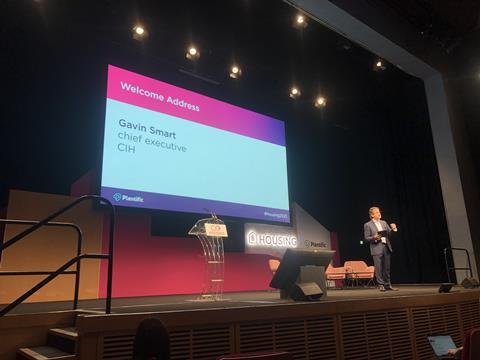Gavin Smart tells conference that leadership of sector cannot be outsourced
Government should treat housing the way it does infrastructure and set a long-term strategic vision for the sector to follow, the chief of the Chartered Institute of Housing (CIH) has said.
Speaking at the beginning of the organisation’s annual conference in Manchester yesterday, CIH chief executive Gavin Smart said that like other key infrastructure such as health, housing “cannot be outsourced” effectively by the state.

“It is for government to set a vision and a strategy for what housing needs to look like in the UK, which we will then work on to play our part in ensuring that we are properly housed as a nation,” he told attendees, calling for a “long-term plan that addresses pressures on supply, quality, affordability, building safety and climate change”.
Smart used his speech to welcome some of the recent legislative changes introduced by housing secretary Michael Gove, who he described as “a known quantity” and “a grown-up”.
He said that while the new requirement for managers across housing providers to be qualified professionals had “generated some significant debate within the sector” there was “more to celebrate than to worry about”.
“It is an opportunity to drive recognition and respect for the work we do, it is a move towards parity of esteem with the other professions that we work with,” he said.
“I think it is a contribution towards housing becoming a recognised career path – a career of ambition.
“Having a qualification alone does not a professional make, but having knowledge and skills is an important part of the picture”.
Addressing concerns that the new requirements could impact diversity and recruitment in the sector, Smart said that the CIH was keen to offer “a flexible approach to qualification”.
Next government should ‘invest to save’, Smart tells Housing Today
“A difficult financial environment does not necessarily restrict government policy changes – the government could make planning changes at any time – but it does restrict the degree to which government can find investment support and that is going to be a challenge.

“A new government coming in will have to do a spending review which will be heavily contested. We would make a strong case for saying that if you get housing right, quite a lot of things will fall off the back of that – you do better in terms of health, community outcomes, criminal justice costs.
“It is an invest to save proposition. Because you have got a housing benefit system that helps people with the cost of their rents, the cost [saved by not building new social homes] does not go away, it just migrates somewhere else.
“The lesson of history is that the housing benefit bill always stays higher and for longer than you think it is going to, so maybe the smart money is to change horses and invest more upfront.
“I say that knowing that it is very difficult to do in practice because you probably have to ride both horses for a while, but government is making investment over 40 years, and they should look at housing in the same way.
“If you only, do it on a year-by-year basis, it always seems cheaper to invest in housing benefit, but suddenly you get 30 years down the line and you have been spending £30bn a year for decades.”
Turning to next year’s elections, Smart said that the Labour Party were “clearly in the running to form or be an influential part of our next government” but that he was not anticipating “unexpected radical change”.
“[There is] no suggestion that they will take a different view on standards and regulation, no suggestion of any moves to radically adjust the sector’s institutional architecture,” he said.
“We might and I think we should expect a strong focus on affordable and especially social housing, although we know that will be subjected to resourcing constraints”
He said that, given the likely resource constraints faced by the next government, there was “a strong case” to look at the distribution of current spending, noting the “vast amounts of taxpayer money” currently subsidising private rents.
He also addressed social media abuse targeted at CIH president Lara Oyedele after an interview with Housing Today in which she made the case for enforcing boardroom diversity through regulation.
>> Time for ministers to enforce boardroom diversity? Meet Lara Oyedele
“I want to be clear to you today that we stand squarely behind Lara as our president and what she said about our need to improve as a sector and her campaign to encourage greater diversity and professionalism,” he told the conference, which responded with a round of applause.
“We will never accept the level of abuse that she was subject to, and I hope you and your colleagues will express support for that”.










No comments yet